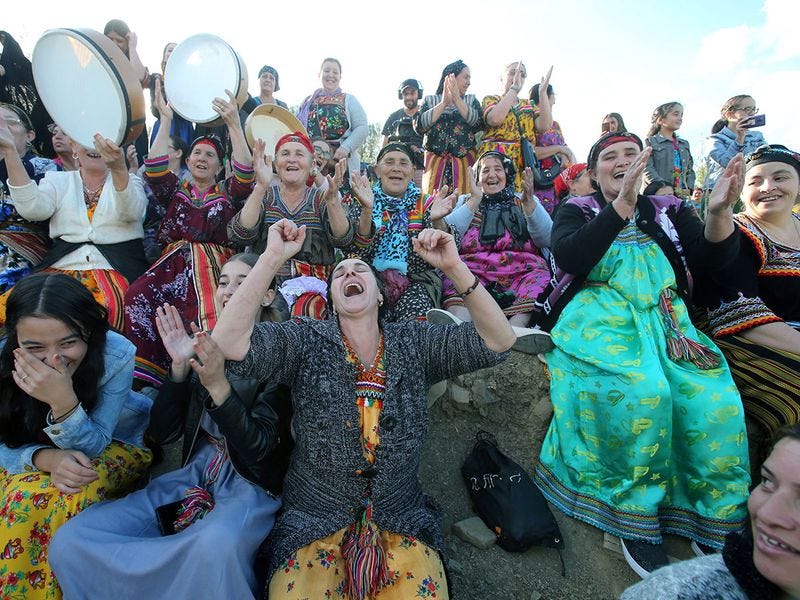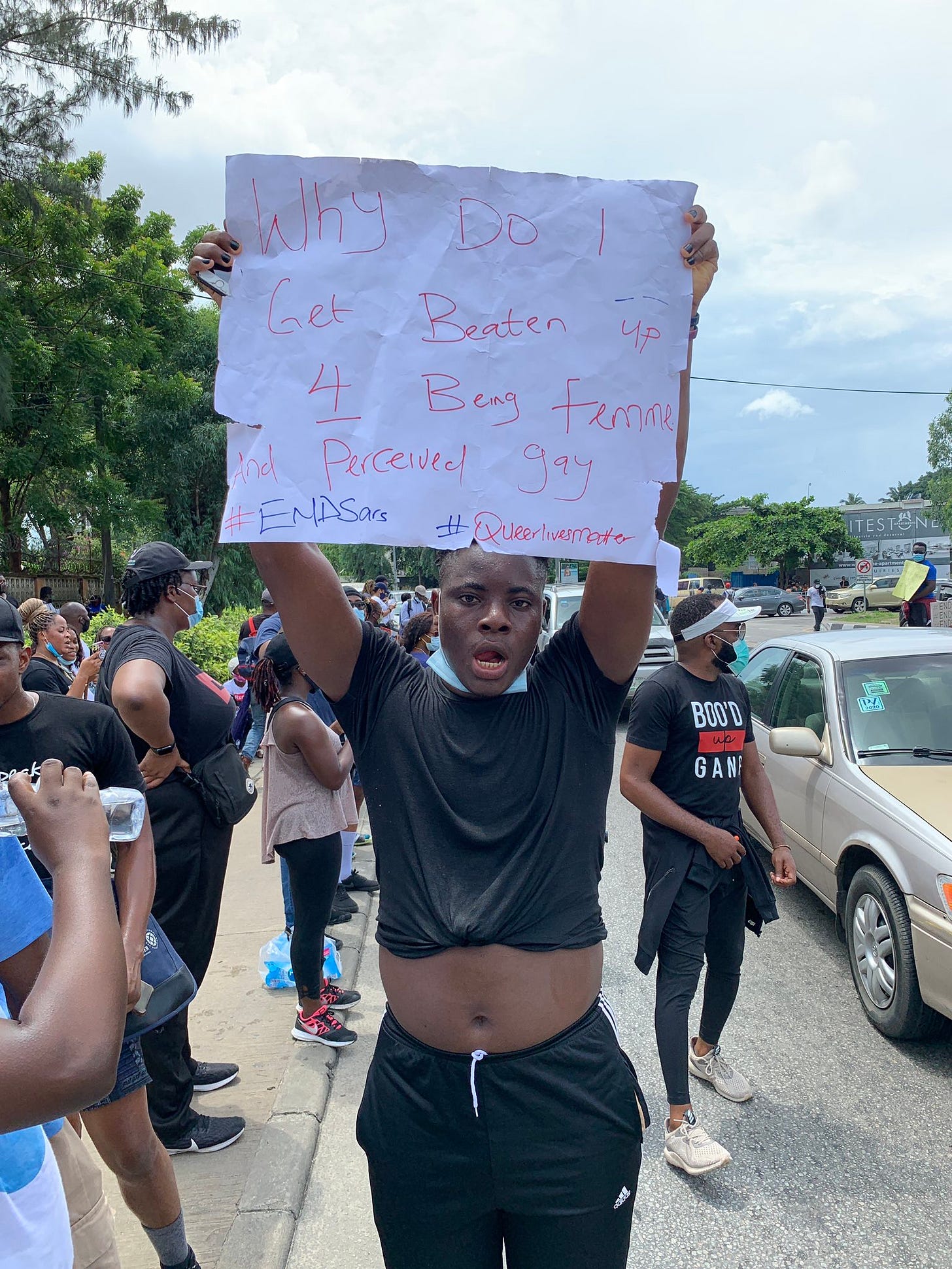Global Roundup: Protesting for TikTok Women in Egypt, gender equality in Algeria and Somaliland, intersectionality in Nigeria, and the release of women's rights activists in Saudi Arabia
Compiled and written by Sahra

Haneen Hossam (left) and Mowada al-Adham.
Activists in Montreal, Canada took to the streets on Saturday to protest against the imprisonment of nine Egyptian women for videos they posted on TikTok. The women were arrested in April for “violating family values” after posting videos of themselves dancing and singing on the app. So far five of the nine have been sentenced to two years and a $19,000 fine. The protestors say that the human rights of the women have been violated and that their actions do not warrant these charges.
I cant believe this is happening. I can’t believe that we’re in 2020 and that we have to fight to able to post things that we want to post (online) - Dalia Tawfik, protest organizer
To many, the charges against these women are about freedom of expression. The Egyptian regime is censoring online expression because it recognizes the power of social media as a tool of organization and collective action. The protestors also say the arrests are misogynistic and aimed at controlling women and their bodies.
I was really shocked. This is not a matter for the courts,..The hypocrisy of it all is what really gets to you…When you’re Egyptian, when you know the society and know how many belly dancing videos are out there - Ehab Lotayef, a moment of the Egyptian Canadian Coalition for Democracy
The protestors are demanding the Canadian government take as strong a stance against Egypt as it does with repression in Belarus and Ukraine. In the meantime, collective action is necessary to fight the system especially when silence is no longer an option.
—————————-

Saudi Arabia will be virtually hosting the Women20 Summit (W20) this week while prominent women’s rights activists remain in jail. The W20 is an official engagement group of the G20 that seeks to ensure gender considerations are present in the leader’s agendas and policy commitments. The summit includes over 80 women’s rights experts who are representing nonprofits, private companies and academic institutions.
The topic of discussion is “realizing opportunities of the 21st century for all”. Some have questioned why a country that is yet to release jailed prominent women's rights activists is hosting this summit.
The Saudi government’s use of women’s rights to divert attention from other serious abuses is well-documented. Recent changes, including the right to drive and to travel without male guardian permission, might be significant, but do not hide the fact that some of the women who campaigned for these changes still languish behind bars - Hiba Zayadin, Human Rights Watch
Do the lives of Saudi women, especially those who are detained, not matter? How can there be discussion about “realizing opportunities for all” when the nation hosting the summit is the biggest violator and abuser of women’s rights? Stop rewarding oppressive patriarchal regimes with summits! Negotiating with such regimes hurts women.
——————————

Sahel: Algerian women in bright Berber dress ululating, singing and beating drums at a soccer tournament last week were pushing their fight for gender equality - a cause that has come under greater scrutiny in Algeria after a brutal attack this month.
Women who gathered at a soccer tournament in Algeria used the event to fight for their rights and demand a bigger role in society. The tournament took place in the village of Sahel which was the host of the third annual competition between women in Kabylie region, a bastion of Amazigh-speaking Berber culture, east of the capital Algiers,
Women’s rights in the country have been at the forefront recently after the rape and murder of a young woman whose alleged assailant had already been accused of attacking her years earlier. The case prompted outrage and protests in Algiers, despite a public ban on demonstrations because of the coronavirus pandemic. Police have arrested a suspect.
Women before weren’t free, weren’t allowed to work outside of the house ... now we have rights, we can be lawyers, pilots, or do any other jobs, and we are equal to men - Houria Hamza, one of the players.
Women had long held influential roles in Kabylie region but a 1990s Islamist insurgency pushed many back into their homes.
There is a lot for women to achieve. Just as much as men. Maybe even more than men - Fadila Bekkouche, head of the village’s women’s association.
—————————-


A mother in Somaliland has powerfully spoken out about the challenges she faces on the basis of her gender and economic class. She criticized the Muslim scholars in the region who use religion to confine women to their homes while staying silent when the rights of women are violated. She condemned the lack of support for mothers and their financial security despite the fact the women make up a significant number of the working-class population. She also criticized the lack of a representative body of women to address the issues women face.
Translation of the video:
Women complain a lot about many different things. I am among them as well (as the ones who are complaining). We are complaining about the religious scholars who come face to face with us whenever we gather to speak. They even come at us at graveyards saying “Tell the women to go, tell them to return and stay in their homes”. We thank God for making us Muslim women. We accept being kept women and everything else the religion permits for us. What we request from these scholars is that when we bring our little portable chairs to the parliament do not jump at us. But when we are selling Khat (an herbal stimulant/drug), or working in the market selling goods/ produce, the mothers who don’t go home until 4:00 am when the husband spends away all the money he earns on Khat. It is mostly women and mothers who go to the schools (regular and religious school) and pay the school fees. I am among the mothers who struggle to financially provide for their children. You (religious scholars ) keep your women at home and support them with the money you make from us. Then you tell the four (few) of us who are struggling to survive to go home and stay there. Where do I go? My children and I need to eat, I am not going home. Are you financially responsible for me? When we talk about women in politics we don’t make up 3%, or 2% or even 0.5%. There are 4-5 women in all of Somaliland that are actively involved in political parties. You have power over us but have not fully thought about what it is you hold over us. To oppress us through the microphone is not one of those powers. Rather, religious scholars should speak out against the many violations of women’s rights that occur just as much as they talk about confining women to their homes. They should speak about the divorces that take place without guaranteeing women child support, the rape that occurs, the financial instability/poverty women face. How do you support children without an income? The money is in the hands of men, the religious scholars are men and there is no representative body for women. All the people here I am related to in some way. Now if I agree to go home who among you will take over my financial responsibilities? Raise your hands.
*translated for coherence and meaning.*
Note: There are two Somali words mentioned in the tweet
“Soomaaliyey” = Somali people
“Hooyo” = Mom
———————————

Protestor and queer rights activist Matthew Blaise @Blaise_21 at a protest against police brutality in Nigeria.
As the #EndSARS/ #EndSWAT protests against police brutality continued in Nigeria, the Feminist Coalition, comprised of several influential feminists, insisted on inclusivity within the resistance. The goal of the coalition, which emerged amid the current protests, is to ensure that feminism and gender equality are centered in the fight for a better future.
The coalition, which has crowdsourced funds that went to provide protestors with legal and medical aid, food, water, and burial funds, has insisted that feminism and the LGBTQ+ community remain central to the protests. On Twitter, the coalition’s statement in support of the presence of LGBTQ+ members in the protests triggered am important conversation in Nigeria.
The Same Sex Marriage Prohibition Act, which banned gay relationships and has further fueled homophobia and intolerance of LGBTQ+ in Nigerian society, was signed by Goodluck Jonathan, then president, in January 2014.
The responses to the statement were a reminder of the importance of feminists and marginalized groups in the resistance. Those who opposed it said the LGBTQ+ community was co-opting the moment. Supporters of the statement said that the fight for freedom from violence and all forms of oppression must be intersectional and must not tolerate one form of oppression as it fights against another. Supporters of the Feminist Coalition’s statement also reminded their fellow Nigerians that intersectionality was important because beyond the protests, women continue to face misogyny and queer people continue to face bigotry. Revolutions must free everyone!
UPDATE: A number of people have been shot dead or wounded at a protest against police brutality in Nigeria's biggest city, Lagos. Witnesses and the rights group Amnesty International said several people were killed and wounded when soldiers opened fire. The state governor said about 25 people had been wounded but only one person had died.
An indefinite 24-hour curfew has been imposed on Lagos and other regions.
————————
Sahra is currently pursuing her undergrad in Sociology, Feminism and Gender studies. She plans to redefine the terms of life to suit her needs and those around her by challenging the patriarchy and other oppressive systems that shape our world. She loves to paint, laugh and spend time with her loved ones.



